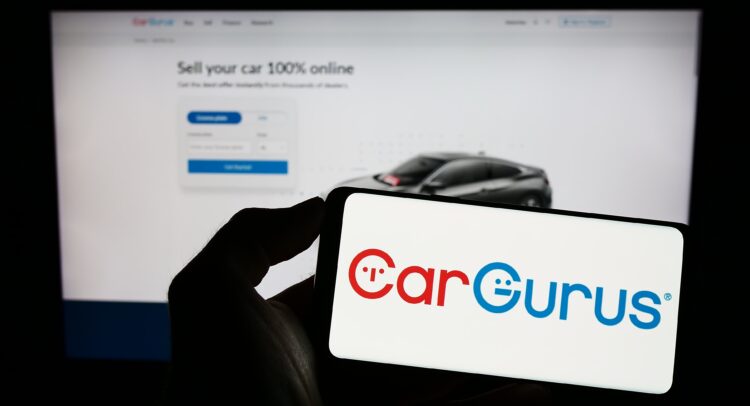Occasionally, market professionals make mistakes, and the bullish unusual options volume for CarGurus (NASDAQ:CARG) seemingly appears to be one of them — at first. An automotive research and shopping website, CarGurus runs into a fundamental problem: it’s not a great time to purchase expensive items. However, consumers largely may not have a choice in the matter. Therefore, I am bullish on CARG stock.
Claim 50% Off TipRanks Premium and Invest with Confidence
- Unlock hedge-fund level data and powerful investing tools designed to help you make smarter, sharper decisions
- Stay ahead of the market with the latest news and analysis so your portfolio is always positioned for maximum potential
Interestingly, following the close of the February 16 session, CarGurus represented one of the highlights of unusual stock options volume. Specifically, the total volume level reached 3,577 contracts against an open interest reading of 18,494. Further, the difference between the Thursday session volume and the trailing one-month volume came out to 309.27%. Drilling into the details, call volume hit 3,282 contracts while put volume reached only 295.
Generally, increased demand for calls represents a bullish outlook since they typically rise in value as the underlying security does. However, such optimism for CARG stock may confuse investors because last year, the Federal Reserve raised the benchmark interest rate multiple times to combat skyrocketing inflation. Also, as TipRanks reporter Vince Condarcuri mentioned, the central bank may continue tightening the money supply this year.
Fundamentally, such a backdrop should be bearish for CARG stock and auto retail-related enterprises. While used-car prices may have tanked relative to their prior highs, the typical consumer finances their rides. Thus, higher interest rates translate to a massive affordability crisis, leading to lower demand for CarGurus.
Still, there’s more to CARG stock than meets the eye.
Analyst Bearishness for CARG Stock Ignores the Key Catalyst
Recently, Piper Sandler analyst Alexander Potter weighed in, downgrading CARG stock to a “Sell.” Potter also presented a pensive case for other auto-related enterprises.
“Cars are becoming unattainably expensive, thanks to costlier debt and a shift toward electrification. Looser supply chains and post-COVID deflation probably cannot rectify this,” Potter wrote in a note to clients last week. “As a result, we think car sales will not revisit historical norms in the coming years.”
Although Potter makes certain convincing arguments, the analyst appears to be sidelining a major catalyst for CARG stock: the choice to buy a new (or new-to-them) car does not exclusively rest on the consumer. Rather, mechanical realities will force the issue.
As you know, even the best-maintained vehicle will require a major overhaul to keep operating. At that point, it typically makes more sense to seek replacement rather than to throw cash into a money pit. Sure enough, increased usage of vehicles overall should benefit CARG stock.
As The Wall Street Journal pointed out, the average age of vehicles on U.S. roadways hit a record 12.2 years. At some point – and some point soon – these vehicles will require replacement. Whether consumers like it or not, they’re going to see their local dealership. However, prior to that, research will be necessary to secure the best deal.
So, investors simply need to do the easy arithmetic: aging vehicles plus a heightened need to spend as low as possible equals a surprisingly bullish case for CARG stock.
A Tough Valuation Profile
Nevertheless, CARG stock won’t be an easy investment to make because it’s counterintuitive. Right now, the market prices shares at 15.6 times forward earnings. In contrast, the sector median sits at 10.93 times. Therefore, CarGurus’ forward earnings valuation ranks worse than nearly 68% of the competition.
Still, this calculation doesn’t incorporate the average age of vehicles in the U.S. Essentially, CarGurus could experience more demand than analysts expect. Also, several enterprises have quashed remote-work privileges. That’s going to lead to more commuting, accelerating the overall wear and tear on U.S.-based cars.
In the meantime, prospective investors of CARG stock can take comfort in other positive attributes. For one thing, CarGurus enjoys a strong balance sheet, undergirded by a cash-to-debt ratio of 6.23 times. Operationally, its three-year revenue growth rate stands at 26.6%, while its net margin pings at 8.56%. Both stats rank at least in the top 20% of the underlying industry.
Is CARG Stock a Buy, According to Analysts?
Turning to Wall Street, CARG stock has a Hold consensus rating based on one Buy, two Holds, and one Sell rating. The average CARG stock price target is $15.33, implying 7.2% downside potential.

Takeaway: CARG Stock Doesn’t Get the Love It Deserves
On paper, it’s too easy for critics to blast CARG stock. After all, higher interest rates and the associated declining consumer sentiment impose a heavy toll on auto retailers. But here’s the thing: that calculation makes perfect sense.
However, when it comes to automobiles, they break down – combustion, electric, it doesn’t matter – and that harsh reality will dictate demand for CARG stock. Given that consumers have already nursed their aging rides to record levels, CarGurus presents a surprisingly relevant investment.
















